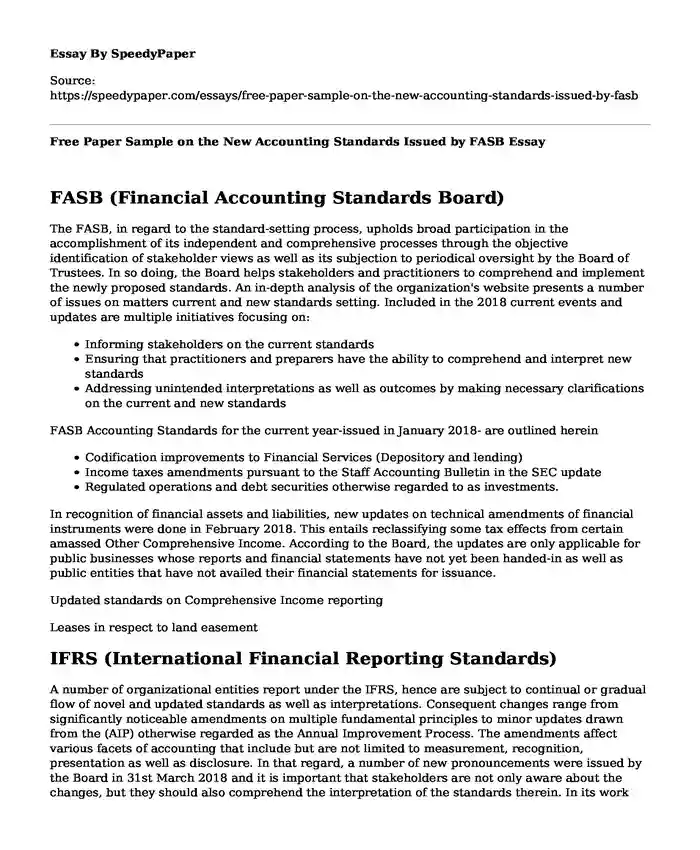
| Type of paper: | Research paper |
| Categories: | Accounting |
| Pages: | 3 |
| Wordcount: | 667 words |
FASB (Financial Accounting Standards Board)
The FASB, in regard to the standard-setting process, upholds broad participation in the accomplishment of its independent and comprehensive processes through the objective identification of stakeholder views as well as its subjection to periodical oversight by the Board of Trustees. In so doing, the Board helps stakeholders and practitioners to comprehend and implement the newly proposed standards. An in-depth analysis of the organization's website presents a number of issues on matters current and new standards setting. Included in the 2018 current events and updates are multiple initiatives focusing on:
- Informing stakeholders on the current standards
- Ensuring that practitioners and preparers have the ability to comprehend and interpret new standards
- Addressing unintended interpretations as well as outcomes by making necessary clarifications on the current and new standards
FASB Accounting Standards for the current year-issued in January 2018- are outlined herein
- Codification improvements to Financial Services (Depository and lending)
- Income taxes amendments pursuant to the Staff Accounting Bulletin in the SEC update
- Regulated operations and debt securities otherwise regarded to as investments.
In recognition of financial assets and liabilities, new updates on technical amendments of financial instruments were done in February 2018. This entails reclassifying some tax effects from certain amassed Other Comprehensive Income. According to the Board, the updates are only applicable for public businesses whose reports and financial statements have not yet been handed-in as well as public entities that have not availed their financial statements for issuance.
Updated standards on Comprehensive Income reporting
Leases in respect to land easement
IFRS (International Financial Reporting Standards)
A number of organizational entities report under the IFRS, hence are subject to continual or gradual flow of novel and updated standards as well as interpretations. Consequent changes range from significantly noticeable amendments on multiple fundamental principles to minor updates drawn from the (AIP) otherwise regarded as the Annual Improvement Process. The amendments affect various facets of accounting that include but are not limited to measurement, recognition, presentation as well as disclosure. In that regard, a number of new pronouncements were issued by the Board in 31st March 2018 and it is important that stakeholders are not only aware about the changes, but they should also comprehend the interpretation of the standards therein. In its work plan, the Board focuses on fundamental standard-setting projects that entail:
- Revenue
- Financial Instruments
- Leases
- Issuance Contracts
- Bearer Assets
- The employment of Equity method in different financial statements
- Rate-regulated activities
The new accounting standards are outlined herein:
- IFRS 9 (Financial Instruments)
- IFRS 15 (Revenue from Customer Contracts)
- The two amendments outlined above supersede IAS 11/18 and 39 as well as any related interpretations dated January 2018.
- IFRS 16 (Leases), a completely novel accounting standard. It supersedes the IAS 17 and is considered "on the horizon" with its effective implementation date set at 1st January 2019.
Conclusion
The new standards will affect all facets of businesses ranging from remuneration schemes, debt covenant compliance, financial reporting which may entail the revision of select accounting controls and processes. With the adoption date closing in, many companies are not yet ready as pertains the effective implementation of the standards. As advised by the Boards, timely adoption and implementation of the standards is vital for a smooth, non-complex implementation process of the standards guaranteeing less time consumption. This calls for the creation of a non-exhaustive list on an entity's plan and status of implementation as indicated herein:
- Building a plan
- Understanding the impact of the new standards on a given organization's financial results
- Developing a communication strategy that entails the monitoring of the implementation plan
References
(2018). Ifrs.org. Retrieved 17 June 2018, from https://www.ifrs.org/-/media/project/2015-agenda-consultation/educational-materials/2016-feedback-statement.pdf?la=en&hash=8E3B5A4747D9FD001427E1275573600075521C0A(2018). Fdic.gov. Retrieved 17 June 2018, from https://www.fdic.gov/news/conferences/accounting/2018-presentations/fasb-sec-kuhaneck-schroeder-color.pdf
Accounting Standards Updates Issued. (2018). Fasb.org. Retrieved 17 June 2018, from https://www.fasb.org/jsp/FASB/Page/SectionPage&cid=1176156316498#2018
Accounting Standards Updates-Effective Dates. (2018). Fasb.org. Retrieved 17 June 2018, from https://www.fasb.org/jsp/FASB/Page/SectionPage&cid=1218220137102
Cite this page
Free Paper Sample on the New Accounting Standards Issued by FASB. (2022, Jun 20). Retrieved from https://speedypaper.net/essays/free-paper-sample-on-the-new-accounting-standards-issued-by-fasb
Request Removal
If you are the original author of this essay and no longer wish to have it published on the SpeedyPaper website, please click below to request its removal:
- Free Essay on the Rate of Imprisonment in America
- Essay Sample for You: Gun Control in America
- Literature Review Example on the Role of Giftedness in Solving Global Problems
- Essay Sample on the Impact of Science on the World
- Essay Sample on How Social Movements Affect Public Relations
- Essay Sample on Why Black Businesses Fail
- Free Essay Example: Parvana's Journey
Popular categories




